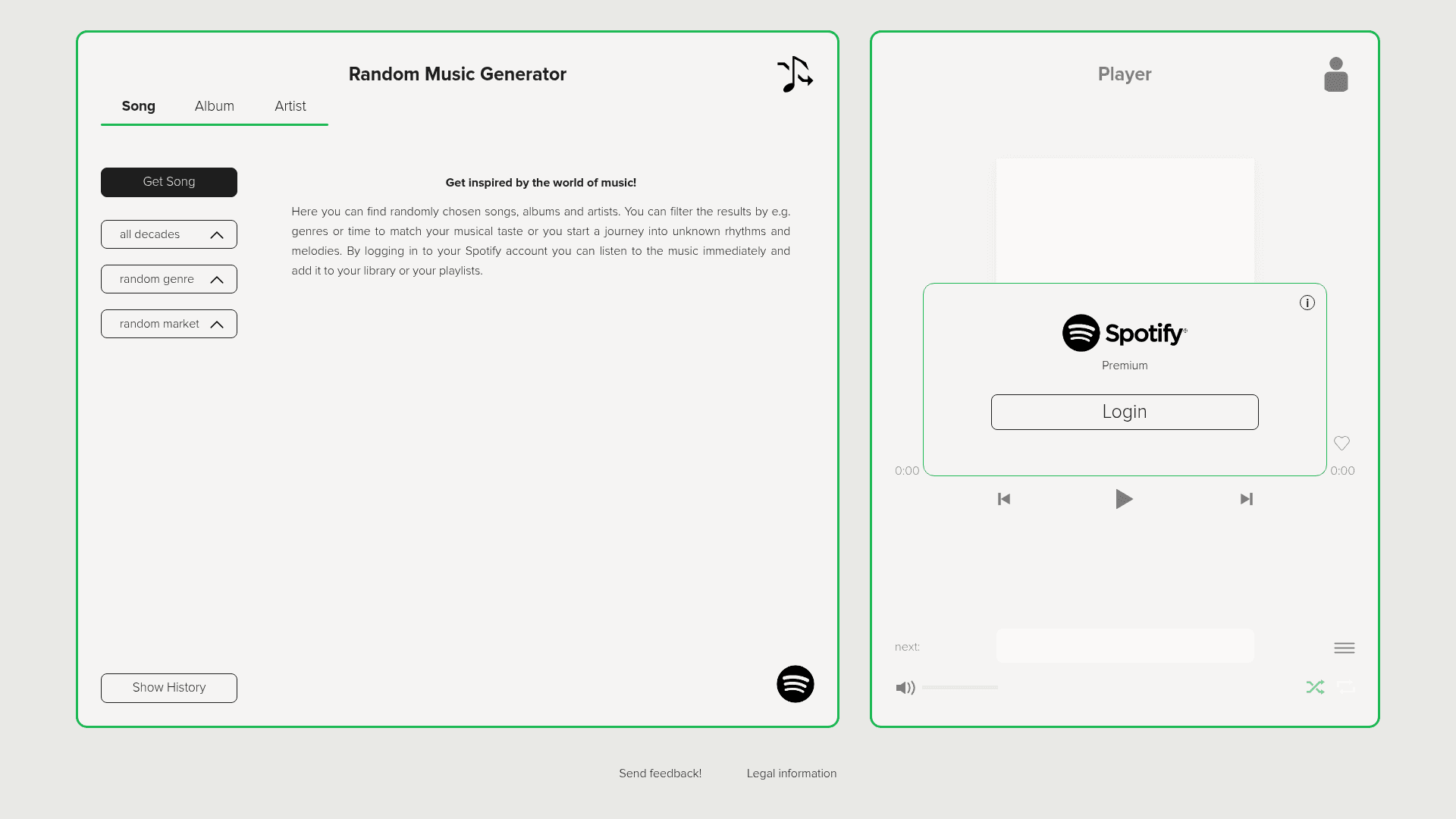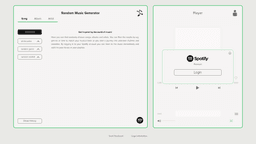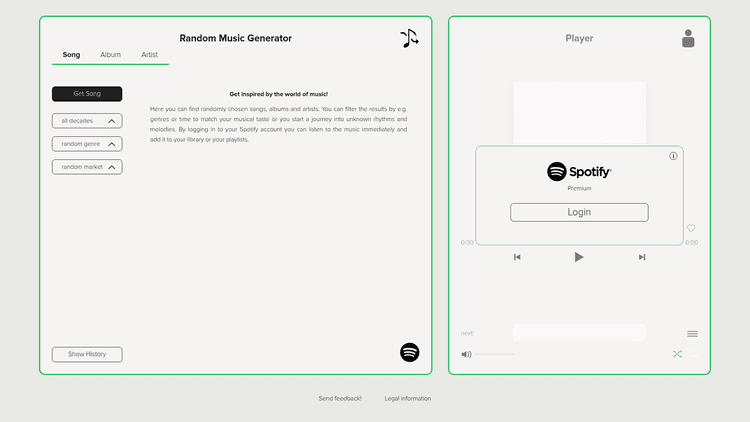



Random Music Generator For Spotify
What is Random Music Generator for Spotify
The Random Music Generator for Spotify is an AI-powered web application that generates personalized random song recommendations directly from Spotify's extensive catalog. Unlike traditional recommendation systems that rely heavily on your listening history, this tool introduces an element of serendipity while maintaining relevance to your musical preferences. By visiting random-song.com, users can access this intelligent music discovery platform that bridges the gap between algorithmic precision and delightful musical surprises.
What sets this Random Music Generator apart from conventional music discovery tools is its unique approach to balancing randomness with personalization. The platform doesn't simply throw random tracks at you – instead, it employs sophisticated algorithms to understand your musical DNA and then introduces controlled randomness within those parameters. This methodology ensures that while you're discovering new music, the suggestions remain within your comfort zone yet push you toward unexplored territories.
The user experience is refreshingly straightforward. How to use Random Music Generator for Spotify couldn't be simpler: users connect their Spotify account through secure authentication, and the system immediately begins analyzing their musical preferences. The interface presents a clean, intuitive design that focuses on the core functionality without unnecessary complexity, making it accessible to users of all technical backgrounds.
Core AI Technologies Behind Random Music Generator for Spotify
Building upon its user-friendly interface, the Random Music Generator for Spotify employs a sophisticated technological foundation that deserves closer examination. The platform's AI architecture combines multiple machine learning approaches to deliver its unique music discovery experience, though the specific large language models or neural networks powering the system haven't been publicly disclosed by the development team.
The core functionality revolves around advanced pattern recognition algorithms that analyze various musical attributes including tempo, key signature, genre classifications, and acoustic features. When you connect your Spotify account, the Random Music Generator processes your listening history through what appears to be a hybrid recommendation system. This system balances collaborative filtering – analyzing patterns among users with similar tastes – with content-based filtering that examines the actual musical characteristics of tracks you've enjoyed.
How does the Random Music Generator maintain the delicate balance between randomness and relevance? The answer lies in its intelligent weighting system. Rather than applying pure randomization, the platform creates probability distributions based on your musical preferences. For instance, if you frequently listen to indie rock, the system might assign higher probabilities to alternative and indie genres while still maintaining chances for discovering electronic or jazz tracks that share similar acoustic properties.
The platform's response time is notably impressive, typically generating recommendations within 2-3 seconds of user requests. This efficiency suggests the use of pre-computed recommendation matrices and real-time filtering mechanisms that can quickly cross-reference user preferences with Spotify's vast metadata repository.
One particularly clever aspect of the Random Music Generator's technology is its session learning capability. As you interact with the tool during a single session – skipping certain recommendations or showing interest in others – the system dynamically adjusts its probability algorithms. This real-time adaptation ensures that each subsequent recommendation becomes more refined without completely eliminating the element of surprise.
The integration with Spotify's API demonstrates robust technical implementation, handling authentication seamlessly while maintaining user privacy. The platform doesn't store personal listening data on its servers, instead processing recommendations in real-time and relying on Spotify's secure infrastructure for user data management.
Market Applications and User Experience
The sophisticated technology behind Random Music Generator for Spotify translates into practical applications that serve a remarkably diverse user base. Who exactly benefits from this innovative music discovery platform, and how does it fit into the broader landscape of music streaming?
Professional DJs and music curators represent one of the most active user segments. These professionals use the Random Music Generator to break out of their usual selection patterns and discover tracks that might surprise both themselves and their audiences. The platform's ability to suggest songs that are familiar enough to be accessible yet unexpected enough to be memorable makes it an invaluable tool for creating dynamic playlists and sets.
Content creators, particularly those producing podcasts, YouTube videos, or social media content, have found the Random Music Generator particularly useful for background music selection. The platform's knack for surfacing lesser-known tracks helps creators avoid copyright issues while discovering music that perfectly matches their content's mood and energy.
Music enthusiasts suffering from what psychologists call "choice paralysis" form another significant user group. These are listeners who genuinely want to explore new music but feel overwhelmed by Spotify's 70+ million track catalog. The Random Music Generator serves as their personal music sommelier, making the discovery process both manageable and enjoyable.
The platform's market positioning is particularly smart in how it complements rather than competes with Spotify's native recommendation features. While Spotify's Discover Weekly and Daily Mix playlists excel at suggesting music based on clear patterns in your listening history, the Random Music Generator fills the gap for users seeking more adventurous discovery experiences.
User feedback consistently highlights several key advantages. The element of surprise generates genuine excitement – users report feeling a sense of anticipation similar to discovering music through traditional radio, but with better odds of finding something they'll actually enjoy. The platform's session-based learning means that users can guide their discovery journey in real-time, creating a more interactive and personalized experience than static playlists.
Response times and reliability receive high marks from users, with the platform maintaining consistent performance even during peak usage periods. The seamless Spotify integration means users can immediately save interesting discoveries to their libraries or add them to playlists without breaking their discovery flow.
However, some users note limitations in genre diversity, particularly for niche or regional music styles. The platform performs exceptionally well within mainstream Western music genres but may struggle with more specialized categories like traditional folk music from specific regions or emerging experimental genres with limited metadata.
FAQs About Random Music Generator for Spotify
How does Random Music Generator for Spotify protect my privacy and data?
The platform prioritizes user privacy by processing recommendations in real-time without storing personal listening data on its servers. Your Spotify authentication uses OAuth protocols, ensuring that the Random Music Generator never has access to your Spotify password. All data processing occurs during your active session, and no personal information is retained after you disconnect from the service.
Can I influence the types of random recommendations I receive?
Yes, the Random Music Generator learns from your session interactions. While you can't set explicit genre filters, the system adapts based on your responses to recommendations. If you consistently skip certain types of songs or show interest in others through saving or playing tracks, the algorithm adjusts its probability distributions accordingly. This creates a personalized randomness that becomes more refined over time.
Future Development and Outlook
The Random Music Generator for Spotify represents just the beginning of what's possible when artificial intelligence meets music discovery. As we look toward the future, several exciting developments could transform how this platform and similar tools reshape our relationship with music.
The integration of more sophisticated AI models promises to enhance the platform's understanding of musical nuance. Future iterations might incorporate natural language processing capabilities, allowing users to request recommendations using descriptive phrases like "something that sounds like a rainy Sunday morning" or "music for a midnight drive through the city." This would bridge the gap between human emotional expression and algorithmic understanding.
Cross-platform expansion presents another significant opportunity. While currently focused on Spotify, the Random Music Generator could potentially extend its reach to other streaming services like Apple Music, YouTube Music, or even emerging platforms. This multi-platform approach would create a more comprehensive music discovery ecosystem that isn't limited by individual streaming service catalogs.
The potential for collaborative discovery features could revolutionize social music experiences. Imagine sharing a Random Music Generator session with friends, where the algorithm considers multiple users' preferences simultaneously to find musical common ground while still maintaining elements of surprise. This could create new forms of social listening experiences that go beyond simple playlist sharing.
Advanced personalization through mood and context recognition represents another frontier. Future versions might integrate with smart devices or calendar applications to understand your current context – whether you're working out, commuting, or relaxing at home – and adjust randomization parameters accordingly. This contextual awareness could make recommendations even more relevant and timely.





No reviews yet. Be the first to review!